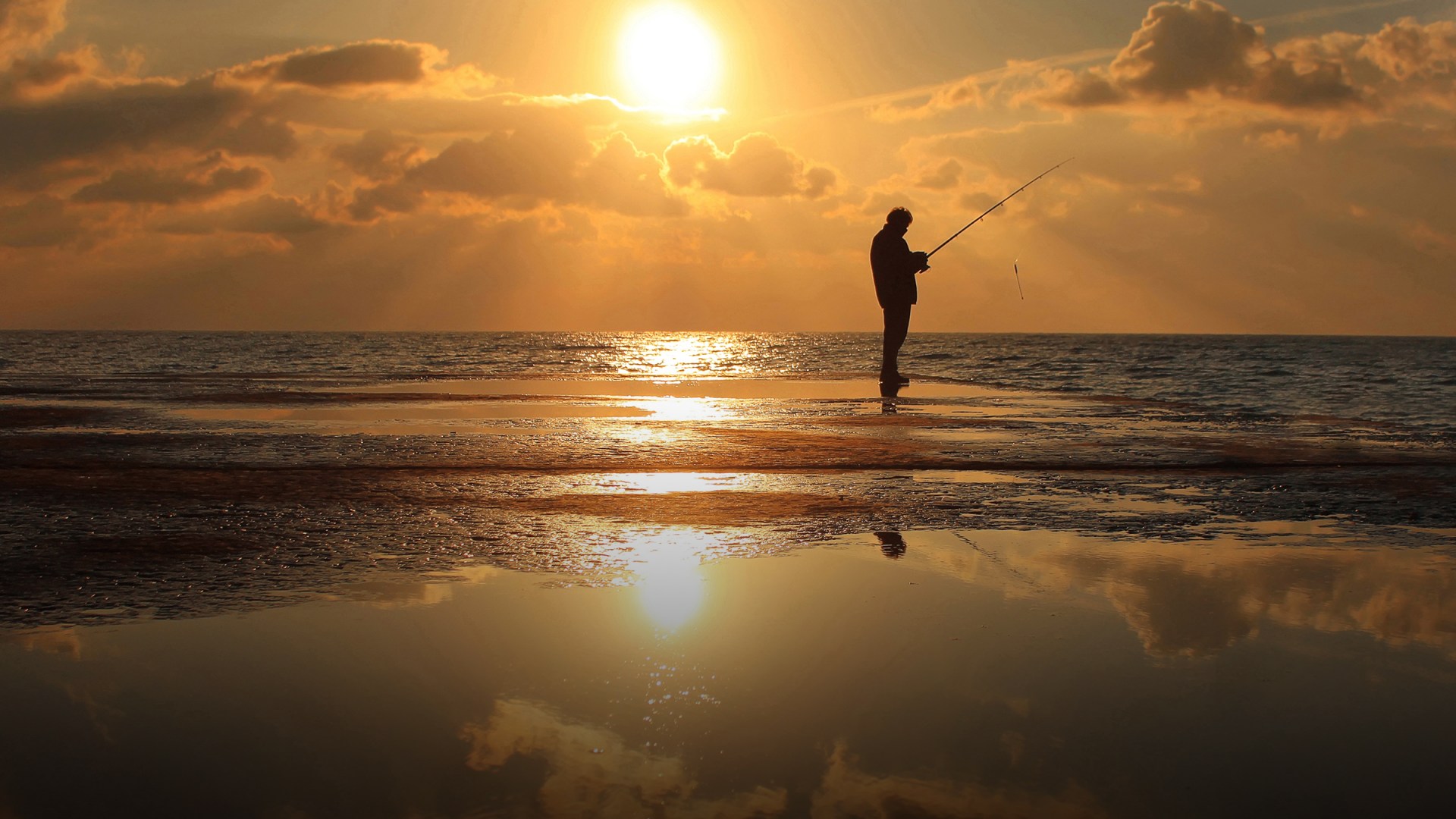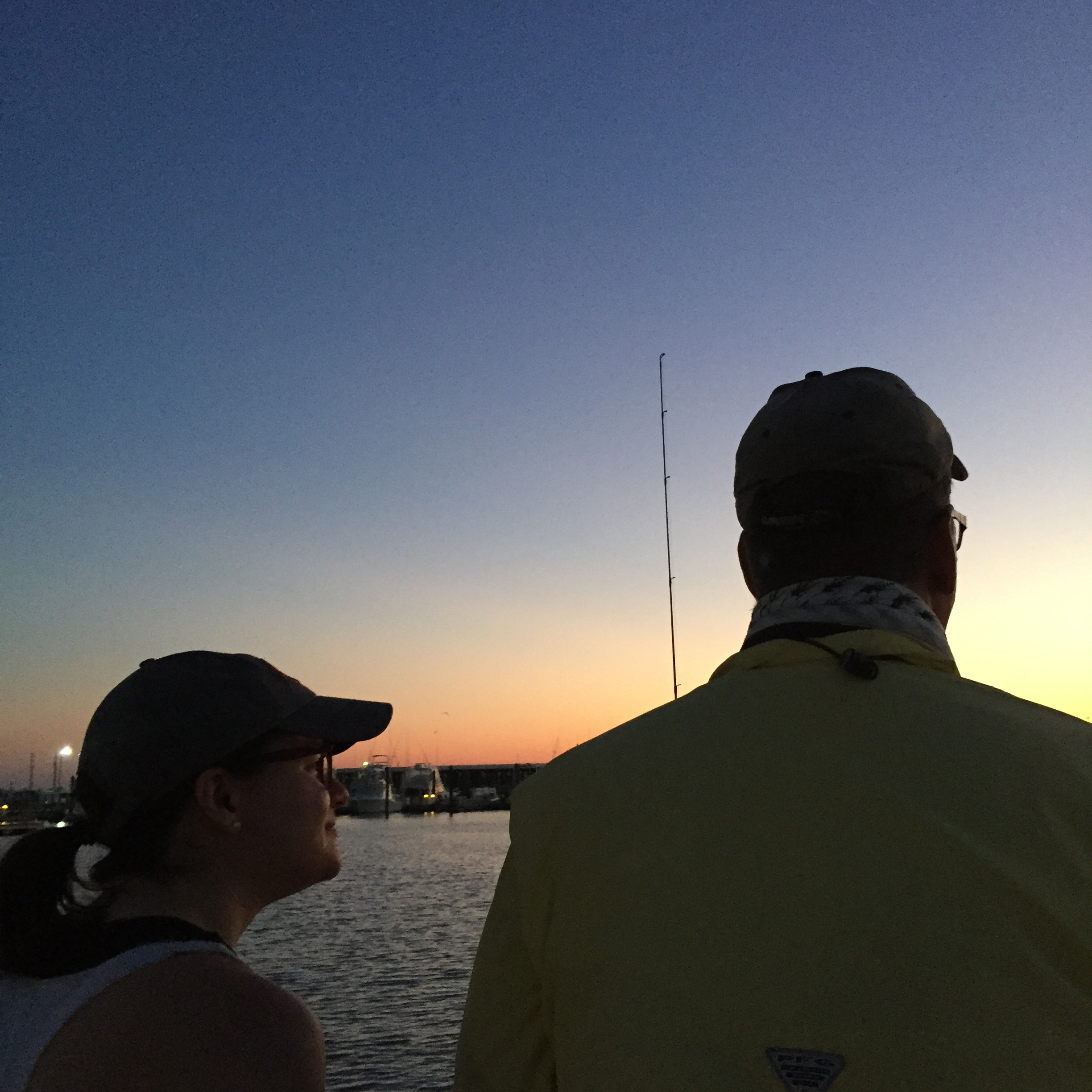In my parents’ home there’s a welded copper sculpture showing three fish of different species, winding and weaving together in a circular shape. Each represents a fish commonly sought for game on the Gulf Coast: speckled trout, redfish, and flounder. The artist called the piece “The Texas Trinity.”
While the title is intended playfully, it is true that my father, a lifelong avid fisherman, pursues this marine triad with a religious fervor. In fact, my dad often goes to the water to worship. His faith in the actual Christian Trinity, mind you, is firm. Though I can’t parse his theology, I can tell you that he feels nearer to God wading in the Texas bay than he necessarily does at church. You’re more likely to find him seeking Sabbath out on the water than in a church pew on a Sunday morning. My ecclesiology doesn’t make much room for that idea, but there’s really no reason to argue about it—this is how it is with him.
Fly fishing, from what I understand, is meditative—a continual, repetitive movement. It makes for beautiful cinema, with men scattering along winding blue streams, gracefully whipping their rods back and forth. The type of fishing my family does is less elegant. The Roeders are bay fisherman. We are German Texan ranchers, after all. Bay fishing is not glamorous: you sit and throw your line, and mostly wait. The bay water is not blue—on a good day, it’s a murky green. I would hesitate to swim in it, considering the number of chemical plants that spot the shoreline. While fly fishing makes cameos in movies, bay fishing is the subject of some incredibly boring, low-budget TV shows.
And yet, for the captivated, there is a magic to it. Dad says it’s a passion that can’t be learned. People are prone to it. There are those of us who, when we feel the tug of a fish swallowing the bait, get a rush of pure delight. You either get addicted to what happens when that fish sinks your line, or you don’t.
From a young age, I was very clearly in the former class. Fishing with my dad, I felt an immediate affinity for redfish. They’re officially called red drum, but in Texas, the nickname reigns—they’re redfish. Redfish bite confidently and pull hard. They have big, strong, stubborn heads and when you hook them, they make a swift run for it. It’s a chase, and it floods me with energy. When I was 12, my dad and I were fishing with a professional guide, who knew of a pack of “bull reds” feeding near the jetties of Port Aransas. Bull reds are mature redfish that have grown beyond 27 inches and 12 pounds—generally female. These fish can live up to 60 years, and the largest one ever caught weighed 94 pounds and was nearly as tall as the fisherman. I’ve never caught anything of that caliber, but I was lucky enough to catch the biggest fish on our boat that day—a 39-inch bull red. I spent nearly an hour reeling it in, a large belt wrapped around my hips with a cup that supported the base of the rod. With my dad coaching, I’d go through slow rotations: wind in and lean forward with the rod as it bends, slowly pull up and draw the fish nearer.
While I favor the feisty redfish, Dad loves to hook a speckled trout. There is no mistaking when a speck’s on the other end of the line; they distinctively shake their heads back and forth to try to fight away—and they often succeed, getting off the line and swimming away. They present a fun challenge for skilled anglers. Dad tells the story of a day that endeared that fish to him: It was the early ’70s, and a band of Roeder patriarchs went to fish off the Copano Bay pier. Dad generally prefers to fish the bay shorelines on a boat, but this pier is unique. It used to be a bridge that was part of the Texas 35 causeway. When they built the new 35, they converted the old one into a huge fishing platform, hooking up lights pointed at the water to attract bait for nighttime fishing. Back then there was no legal limit in place for how many trout you could take home; if it was 12 inches or longer, it was a keeper. That day, off that pier, they struck a big school. Dad said they must have caught over a hundred speckled trout, nearly more than they could manage to carry home.
For Dad and me, catching a fish is a rush of pure joy. Maybe it’s making a connection with a piece of nature, the otherness of this mysterious animal we would never behold otherwise. Maybe it’s a chemical rush—our competitive side that kicks in, wanting to outperform the fish (and each other). Perhaps it’s a tiny fulfillment of our Genesis 1 benediction to “rule over the fish in the sea and the birds in the sky and over every living creature that moves on the ground” (v. 28). I like to think that, in and through all of those things, it’s experiencing a snippet of the joy that God has written into creation, joy that is, of course, born out of the relational delight of the Trinity.
I suppose every father wants to gives his children a taste of what brings him joy. I saw this image vividly in my dad when I was young: After a dozen casts, he finally finds the first fish of the day. Ensuring that it’s well hooked, he hands the rod over to one of us: “Come here, I want you to reel this in.” It’s a small sacrifice towards a greater end: I want you to experience my joy.
I can remember watching Dad become gleeful the first time we went wade fishing together. Over waterproof overalls, we put on wading boots and stingray protectors. Each holding our reel, we walked slowly into the brown bay water. I followed him, nervous of jellyfish as I shuffled my feet along the bay floor. Waist deep, we cast our lines out, and several minutes later, Dad hooked a redfish. Watching the fish he had just caught swim right up to us, I lost my inhibitions about safety. I could see that Dad, taking the fish in his hands, was filled with wonder. He actually cried out, “Thank you, Father!” Dad’s kind of worship service.
When I ask my dad why he favors fishing in the Texas bay above freshwater or fly fishing, he talks about what it’s like to go out on the bay before sunrise. He mentions cloud formations, solitude, quiet, and the lack of civilization. “There’s no people out there. You get to enjoy God’s artwork.”
“So it’s stress relieving for you?” I reply.
“I guess there is a therapeutic element of it. But that’s not why I do it. I do it because I love it.”
Similarly, I don’t primarily like fishing for its benefits—recreational or otherwise. There are certainly life lessons in it. I could tell you what fishing has taught me about accepting lack and abundance—about many disappointing days of long drives, sunburns, and not a fish to cook for dinner. I could get poetic over what it teaches you about patience. And about days that resembled John 21, where the disciples “were unable to haul the net in because of the large number of fish” (v. 6)—like the day when I was 15, when we hit a school of hungry redfish, throwing cast after cast and hooking a fish every time the line hit the water. About my dad eventually dumping our live bait off the back of the boat to get us to call it a day. I could describe the slivers of natural beauty you experience deep in the bay, or share the words of “All Creatures of Our God and King,” which I have sometimes sung to myself out on the water.

But these are subsidiary benefits to fishing, in my mind. I fish, foremost, because when I’m fishing, I’m communing with my dad, who, doing what he loves most in the world, is experiencing the delight of the Trinity. I like fishing because it’s the one activity my father and I share. His grandfather taught his dad, and his dad taught him, and he taught his kids. It’s what sons of Texas do—and daughters. My parents had three girls, and though my dad adores us and thanks God for us, he, of course, always hoped for a son. You can hear this longing in the naming of his last two daughters: Andie and Alex. My parents gave me the middle name Marina, and in some way marked me: I ended up being the kid in the family with an affinity for fishing—my dad’s one piscatory partner. The other two kindheartedly participate when he asks them to, but they didn’t get the thrill I did the first time Dad handed me his rod to reel in a catch.
God shows us his pleasure in various and personal ways. For Dad, it’s in the water and what he draws out of it with his rod. For both of us, it’s also in inheriting a tradition. You won’t find me fishing alone. Most likely, I’ll be with my dad. You might find me eventually, I hope, fishing with a son or daughter, and with my dad, and we’ll both be handing our rods over, hoping to see the next generation feel God’s joy in a fish.
See this issue's poem, which also focuses on fishing with fathers.
Andie Roeder Moody is assistant editor of The Behemoth. You can find her on Twitter as @andiemoody.











